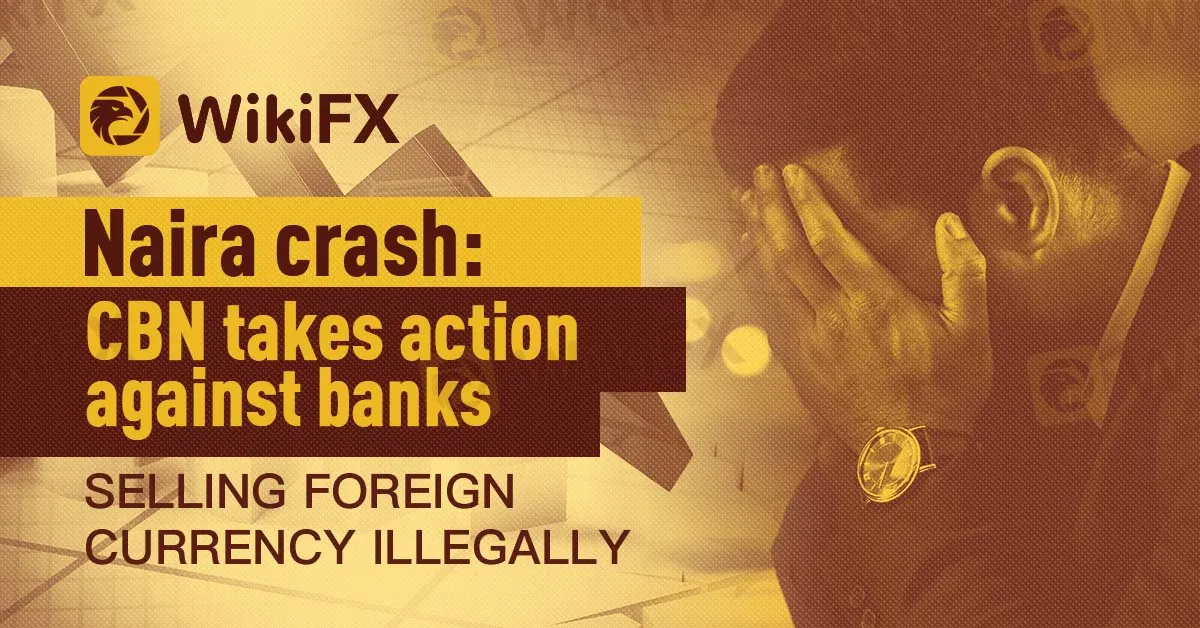简体中文
繁體中文
English
Pусский
日本語
ภาษาไทย
Tiếng Việt
Bahasa Indonesia
Español
हिन्दी
Filippiiniläinen
Français
Deutsch
Português
Türkçe
한국어
العربية
Naira crash: CBN takes action against banks selling foreign currency illegally
Abstract:The Central Bank of Nigeria (CBN) has warned to penalize commercial banks that sell foreign currency without authorization.

The Central Bank of Nigeria (CBN) has warned to penalize commercial banks that sell foreign currency without authorization.
This comes after reports that deposit money banks are diverting most of their foreign currency to the unofficial foreign exchange market rather than selling to their customers, which caused the naira to plummet to over N950 to $1 in the parallel market as FX scarcity deepens.
The acting CBN Governor, Folashodun Shonubi, said this while giving a lecture in Abuja on “Diaspora Remittances and Nigerian Economic Development”.
Shonubi stressed the significance of taking stringent measures to limit illegal remittances and direct them through suitable channels in order to maximize economic growth.
High cost of remittances sent to sub-Saharan Africa from diaspora
The creation of a commission that would make impromptu trips to banks suspected of forcibly selling dollars was announced.
He stated:
We must publicly denounce commercial institutions that have engaged in such misconduct.
The acting governor also highlighted the drawbacks of the current remittance system, estimating that it costs around 8–9% of every $100 to send money from the diaspora to Sub-Saharan Africa, which is the highest cost in the world.
However, he pointed out that Nigeria received remittances totaling around $16.7 billion, the vast bulk of which was sent outside the country's official foreign exchange market.
Shonubi declared:
We are making great efforts to persuade people to invest in the formal sector rather than the increasingly difficult-to-manage informal channels.
To be renamed, the I&E window
The head of the CBN remarked that despite efforts to encourage people to participate in formal market transactions by offering a N5 rebate through its Naira 4 Dollar program, the policy was still ineffective, leading to the N5 rebate's discontinuation.
He acknowledged the value of incentives in luring consumers to the legal market, though.
He declared:“Since it is the only market we recognize, we will rename the foreign exchange market, formerly known as the I & E market, to the Nigerian Foreign Exchange Market.”
Ayodele Adeleke, the Commandant of the National Institute of Security Studies, stressed the value of the lecture series in raising national security awareness. He claimed that one of the strategies used over the 10-month course to advertise and give the program a focal point was the series.
What you must understand
In a similar incident, Shonubi blamed the divergence of remittances from the diaspora to illicit markets like the parallel for the collapse of the naira against the dollar and its failure to control the foreign exchange market.
He clarified that a lot of dollar-denominated remittances from the diaspora arrive in Nigeria but are not legally recorded because they are intended for the black market.
He claimed that one of the strategies used to advertise and give the program a focal point was the television series.
The unofficial market, often known as the parallel market, presents a dilemma because it is not controlled, making it a convenient location for illegal activity.

Disclaimer:
The views in this article only represent the author's personal views, and do not constitute investment advice on this platform. This platform does not guarantee the accuracy, completeness and timeliness of the information in the article, and will not be liable for any loss caused by the use of or reliance on the information in the article.
Read more

The Latest Arrest Cases in Illegal Forex Trading
Explore this story showing the arrests made in two forex trading scams involving INR 7 core and INR 43.83 lakh, respectively.

IQ Option: Regulation, Warnings, and What Traders Need to Know
A closer look at IQ Option reveals a gap between appearance and reality that could cost traders more than they expect. Let’s take a closer look at this!

Clones of ThinkMarkets Are Lurking | Don’t Fall for the Fake
A silent threat is creeping through the online trading world, and even the most experienced traders may not realise they’re walking straight into it. Several clones of ThinkMarkets, one of the industry’s most trusted brokers, are now circulating online, posing a serious risk to anyone trading on what they think is a legitimate platform.

Top 5 Forex Brokers Offering Islamic Accounts in 2025
Are you a Muslim trader who wants to start your trading journey and is seeking licensed and reputable forex brokers that offer swap-free (Islamic) accounts? Your search ends here. Checkout these 5 trusted brokers that offer swap-free (Islamic) accounts.
WikiFX Broker
Latest News
FXTM: A Closer Look at Its Licences
Tiger Brokers Expands Hong Kong Operations to Tap Offshore Chinese Wealth
U.S. Treasury yields rise after Trump announces Israel-Iran ceasefire
Gold Prices Down in Early Hours of Spot Trading Today in India
Purple Trading Penalized €150,000 Over Compliance Failures in Cyprus
Asian chip stocks rise after Nvidia reclaims title of the world's most valuable company
Nvidia's comeback sparks a rally in Asian chip stocks
CNBC Daily Open: Despite all the uncertainty, the S&P 500 is flirting with record highs — strange times
PU Prime and AFA Announce Partnership at Madrid Event
The top private and public colleges for financial aid — 5 offer average scholarships of more than $50,000
Currency Calculator


